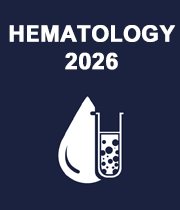Title : Special considerations regarding anticoagulation in COVID-19: Bleeding risk scores evaluations
Abstract:
Thromboembolism seems to be a challenging problem globally in coronavirus disease-2019 (COVID-19). Hypercoagulable states with unusual higher tendency for thrombotic events were described among severe and critically ill patients with COVID-19 infection with lower survival rates. Several studies have assessed the role of anticoagulation (AC) to prevent the thrombosis problems. However, Anticoagulation therapy is a treatment that needs special considerations regarding its dosing and monitoring to minimize the risk of bleeding. Our study aimed to compare the different patterns of AC in patients with COVID-19 and compare two of the validated risk scores in the prediction of bleeding events. We retrospectively reviewed medical records of COVID-19 patients who assigned for empiric anticoagulants. The main outcomes included survival, bleeding events and the need of mechanical ventilation. The predictive accuracy of HAS-BLED and ORBIT scoring systems were assessed by applying the
We applied the HAS-BLED and ORBIT bleeding risk scores to assess the receiver operating curve (ROC) and c-statistics. A total of 921 patients were eligible for the study according to the inclusion criteria. Of them, 51.6% received therapeutic AC while prophylactic AC dose were received by 48.4%. D-dimer and C-reactive protein (CRP) were significantly higher among patients received therapeutic AC (P<0.001) with a significant prolongation of hospital stay and mechanical ventilation need (P-value < 0.001 and 0.011, respectively). The mean±SD of HAS-BLED and ORBIT scores were 2.53 ± 0.93 and 2.26 ± 1.29, respectively. The two risk scores differed significantly for major bleeding events and clinically relevant non-major bleeding (P<0.05) with modest predictive performance. To sum up, therapeutic AC showed an association with higher incidence of bleeding events. The HAS-BLED scoring system showed higher accuracy than ORBIT in the predictability of bleeding risk.
Audience Takeaway:
- In this study, we showed that the HAS-BLED scoring system more precisely predicted clinically relevant bleeding events when compared with the ORBIT score. The HAS-BLED and ORBIT scores may offer hopeful tools to measure the bleeding risk
- The application of these bleeding risk scores can be beneficial in clinical practice by drawing attention to bleeding risk factors that could be modified; hence; may alleviate or eliminate the potential risk. Our analysis consistently confirmed that a higher risk score in the HAS-BLED system was associated with the evaluated outcomes: major bleeding; non-major bleeding; and all-cause mortality. The association between bleeding events and in-hospital mortality is well documented, consistent with our results, where the HAS-BLED score was related to bleeding events and, thus, to mortality
- The HAS-BLED score can be utilized for clinical or electronic alerts to ‘flag up’ patients with a potential risk of bleeding for more careful evaluation and medical follow-up and to draw more attention to potential bleeding risk factors that can be modified
- An objective assessment of the bleeding scores before the beginning anticoagulation therapy would provide a way to accurately weigh up the potential benefits and risks



